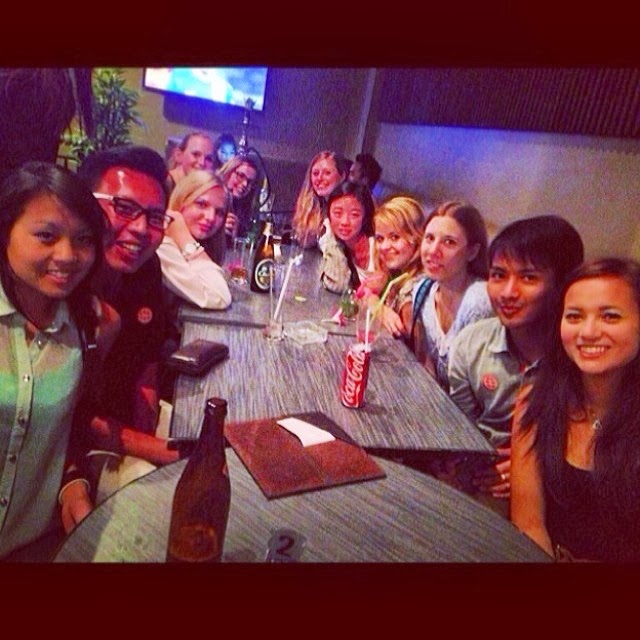Week 4 already and our fellow student,
Joshua, is almost halfway on his Grand Tour journey in Thailand. He has made
friends with local and international students. He noticed that the Thai
people often referred the international students who come from Western
countries as “farangs”. After talking to his Thai friends, Max and Little, he
came to understand that the term does not mean to be offensive and that the
presence of “farangs” in the country is seen as a positive thing.
Farangs VS Thais
First thing that probably
pops up in your mind: What the heck is “farang” (or "farangs" in plural)?
Another lesson learnt this week, this term is none other than “bule”, a term commonly used in
Indonesia. Similarly, “bule” can also
be interpreted as foreigners especially white people. Is the usage of this word
offensive? Even though it is controversial, it is generally accepted in the local
community. Just to give you a little bit of what “farang” is perceived in Thailand, here is the definition by Urban
Dictionary:
‘Thai word for white people or Westerners,
generically referring to non-asians. Generally used without derogatory connotation,
derived from the Thai word "farangsayt" for French.’
To be honest, I do not
want to ignite a racist clash because of this title. I think it is interesting
to bring this topic up, as this week’s blog will feature two of my Thai
buddies, Max and Little. Not to mention that they are my mobile Google to get
an insight into Thai cultures, but also I am curious to know how they perceive
the influx of foreigners in their country including us, the Grand Tour
students. Thus, this is how my casual interview with both of them goes.
A 21-year-old Max who was
born to a Lao father and a Thai mother is currently a second-year student in
the Faculty of Business Administration at Rangsit University. He is my first
Thai friend that I met from the previous Buffalo Village field trip last week.
Since then, I have spent more time with him having dinner together as well as
introduced him to my fellow Grand Tour colleagues. Originally from a rural area
near Thailand and Laos’ border, check out his response below regarding the
issue of “farang”:
Q: What do you think about the presence of foreigners/”farangs” in your country?
A: I am thankful that many foreigners come to Thailand.
It is a positive thing. We (refer to Thai
people) are very welcome to foreigners because we can share our cultures and
learn new languages as well. I also learn a lot from you to improve my English
skills.
Q: So, what does “farang”
mean for you?
A: Well, “farang”
is a Thai word that only refers to western people. It sounds similar to the
word “foreigner”, but since it is difficult for Thai people to pronounce, it is
then a habit to call foreigners as “farang”.
I would say that it is not rude at all. Interestingly, the word “farang” itself also literally means
guava as the fruit in Thai language.
Q: Are you used to seeing “farangs” in your hometown, for example or rural areas?
A: I saw them also in my hometown. In fact, there are
many women who get married with older “farangs”
because many people believe that they will be rich. Many of us think that “farangs” are rich. That is the reason so
many “farangs”, even in the rural
areas, get married to local women.
A 2nd year
Thai girl from the Faculty of Liberal Arts majoring in English, Little, as the
name suggests, is my little friend with a big heart as she is very nice and
helpful. Born and raised in Bangkok, Little is proud of studying at Rangsit
University because of these reasons!
Q: How do you feel studying at Rangsit University?
A: I think Rangsit University is the best university for
me because it is very famous in Thailand and you can get a good job after you
graduate. Rangsit University has set high standards of education and teaches us
invaluable lessons of practical corporate life which would help us in the
future.
Q: What do you think about the exchange programmes at
Rangsit University? Do you like more foreign students to come here?
A: Yes, of course. I think the idea of students exchange
is a good idea to know more about other people’s cultures from various
backgrounds. This makes me curious. Besides, I can be a more open-minded person
that is able to handle different intercultural situations. Even though I am shy
at first, but I am trying to communicate in English to be better.
To sum up, Thai people are, in general, very welcome
towards foreigners and different cultures. In Rangsit University, for example,
many of the local students are eager to learn from different nationalities and
various cultures, including me myself too. For me, it may not be too obvious
that I am a foreigner since I look like Thai. For the other Grand Tours, I
believe that they are not offended when someone calls them “farangs” due to their “sabai-sabai”,
which means chillax in Thai.
So far, I have not experienced or at least, noticed
any resentment against “farangs” in
Thailand, but it may be interesting to know that there must be someone in the
society that dislikes the presence of “farangs”.
Even so, just like what karma teaches us, if your deed is bad then you must pay
for it. That is why it is important for me as a Grand Tour student in Thailand
to pay respect to the local customs and adapt to them in order to avoid any
trouble.
Lastly, thank you very
much my buddies, Max and Little! If you would like to connect with them, add
them as your friends on Facebook above J
.jpg)

_enjoying_their_desserts._Yum!_I_want_to_join_you_too.jpg)

No comments:
Post a Comment